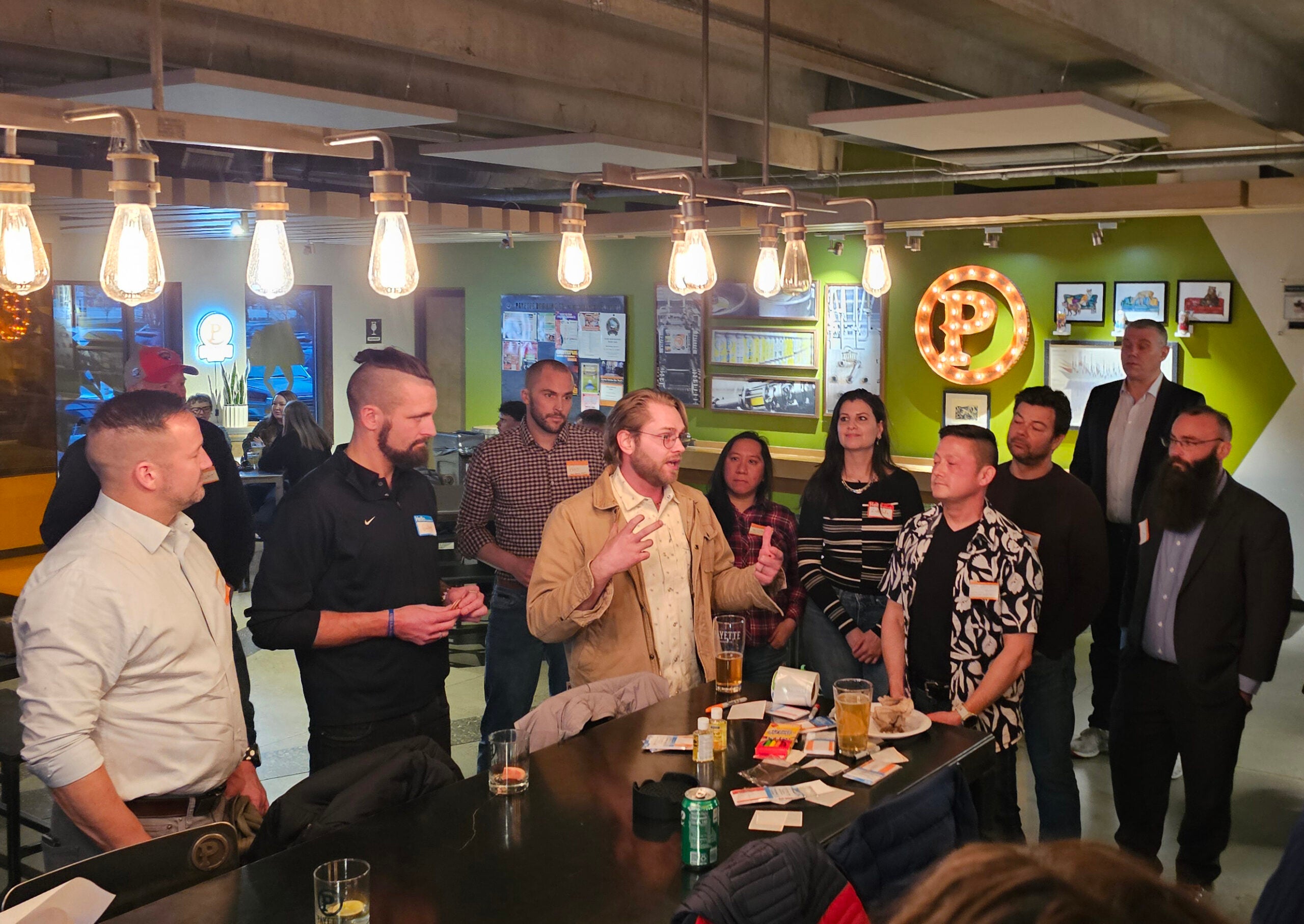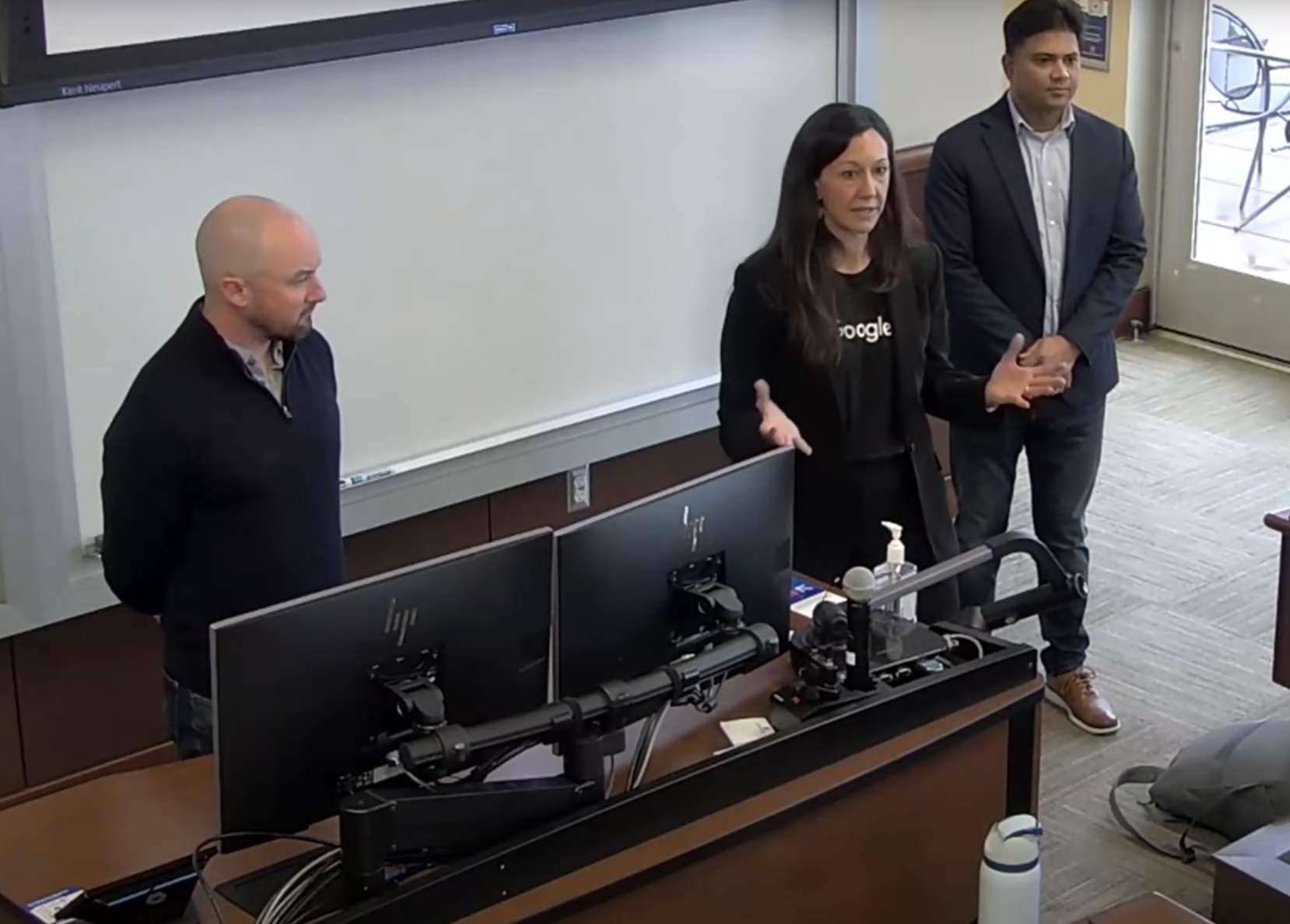
What began as an artificial intelligence special interest group for Boise State’s College of Business and Economics faculty has grown into a cross-campus and cross-community collaboration that has helped members forge connections and share ideas around the ever-changing landscape of AI.
The COBE AI Brown Bag group meets every other Friday and covers AI use cases and new innovations. The group is hosted in the Micron Business and Economics Building and on Zoom, and sees regular attendance from as many as 20 Boise State faculty and staff. Attendees include representatives from the College of Business and Economics, Office of Information Technology, Department of Philosophy, Public Safety, The Center for Learning and Teaching, the School of Nursing and the Office of General Counsel. Boise State students and community members associated with area businesses or community groups like TheUnstoppables.AI also attend. Recently the group has welcomed guest speakers from Google AI and OpenAI education.

Kevin Rank, lecturer for Information Technology Management, convenes the group. He’s also The College of Business and Economic’s inaugural AI fellow, a designated thought leader charged with fostering engagement around artificial intelligence by bringing together faculty, staff, university partners and the business community to explore its impact on business education and practice.
“I’m trying to be a leader with AI and actively trying to be a part of the change,” Rank said. “There are two major views about AI: the pessimist and the optimist. I like to think I’m somewhere in the middle as a realist. No matter how much I would want to fight AI, it’s not going to matter. AI is going to be here. So, instead of fighting it, I want to learn to use the tool effectively. That way I’m ahead of the curve and can hopefully find opportunities for my students and the community to be involved.”
Brown bag beginnings
The COBE AI Brown Bag group first met in spring of 2023. Back then, it was made up solely of College of Business and Economics faculty members who were interested in using AI for teaching and research. They also wanted to help their students understand how to use AI responsibly, preparing them to enter the job market with practical AI skills.
Then, Rank attended a Social Impacts of Computing Workshop event that welcomed people from all different disciplines and area businesses to talk about AI and society. Inspired to make AI collaboration more commonplace, Rank began inviting more people to the COBE AI Brown Bags, including those from outside the college.
“Honestly, that’s been one of the really cool things about this group,” he said. “I’ve met people I otherwise probably wouldn’t have talked to from all across campus. Now we’re meeting and talking and putting faces to names – we’re really building community. It has also brought the opportunity to have people from OIT or philosophy take part in our classrooms. That’s the sort of cross-pollination that would never have happened without the AI Brown Bags.”

Brian Bolt, deputy chief information officer for Boise State’s Office of Information Technology, was initially invited to co-present about campus AI initiatives from his office’s perspective. But he’s continued to attend the meetings, building important connections.
“One of the cool things that happened as a result of our involvement is we got to know Kevin Rank and [COBE professor] Dan Rush and started to understand some of the challenges that they were facing tech-wise in their research and in the classroom,” Bolt said. “This allowed us to have deeper conversations and begin resolving some of the issues they’ve faced related to AI. The vendor connections are another great benefit. The group brought Google and OpenAI to campus to share their AI roadmaps and answer questions. Oftentimes, OIT is the gateway to passing along staff and faculty questions, so when vendors actually show up in the room, it’s really valuable for all of us.”
Connecting AI to the classroom
Students also attend the meetings and lend their perspectives. They’ve shared how they’re leveraging AI to help them take notes and create study guides and additional tools they use personally. These lessons and discussions can transfer into classrooms, helping students learn about AI’s capabilities and how it applies to their future jobs.

Steven Hyde is an assistant professor in management whose research around job postings data shows how AI is affecting the job market. Hyde has seen disruption in traditional roles, reductions in skills listed in job postings and the creation of an entirely new type of boundary worker between AI and humans.
“We’re currently in an industrial revolution with AI and automation. If our students are going to be competitive, they need to know AI,” Hyde said. “If universities don’t teach students AI literacy, we’re not setting them up for life in the society they’ll be working in. They have to adapt – there’s no choice. Because of that I’ve heavily adopted AI in class.”
Hyde incorporates AI into his BUS450 Business Policies class, which is taken by fourth-year students. In the course, students complete weekly tasks using ChatGPT, Claude, Gemini and Midjourney, helping them develop AI literacy and an understanding of each platform’s strengths. Hyde ensures the assignments push students beyond simply talking to AI and requires them to use AI to create tools.
Rank also integrates AI into his courses. In ITM 310 Business Intelligence, taken by second- and third-year business students, assignments involve using AI for things like creating study guides based on lecture transcripts, slides, notes and textbooks. Rank also teaches an AI-specific class, ITM 370 AI Augmented Projects, where third-year and higher students have deep discussions about AI ethics and learn to apply and refine their AI skills to automate tasks.
“I teach about AI from the perspective of helping students develop skills they can use in their college classes, and eventually the job market,” Rank said. “When I was a little older than these students, job applications asked for Microsoft Office skills. Now jobs are specifically asking for generative AI skills. These students are the generation that will live with AI throughout their entire careers. I want them to think about AI more deeply and have a well-rounded understanding of how to use it.”
The joy of AI exploration
Practical applications aside, Rank says he simply finds learning about and using AI interesting and joyful. Research backs this up. A recent paper found an increase in positive feelings associated with using GenAI.
“During an AI panel I was on, another panelist commented that a lot of people who use AI have a level of joy in using it,” Rank said. “You’re exploring something new and using it to create these novel experiences. It brings us joy to see what AI can do and share that with others.”
For more information, or to join upcoming COBE AI Brown Bags, contact Rank at kevinrank@boisestate.edu